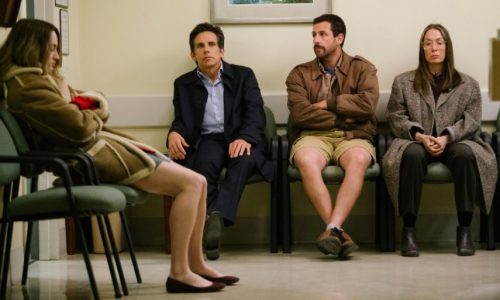
Sunday might be a day off for most people back home, but in Cannes, it’s one of the busiest days of the festival. It got off to an early start, with an 8.30am screening of Noah Baumbach’s family drama The Meyerowitz Stories (New and Selected). The first thing to note, given the controversy about streaming-only films being eligible for the Palme d’Or, was the cheering when the Netflix logo appeared at the start, as opposed to the booing that accompanied the logo for the company’s other competition film, Okja. Happily, the film lived up to its enthusiastic welcome. A highly accomplished drama – with comic undertones – neatly judged the relationships between Dustin Hoffman’s increasingly cantankerous patriarch, his children – including half brothers played by Adam Sandler and Ben Stiller, and the next generation. Exploring themes of shame, guilt and regret, it’s a film that will resonate particularly with anyone with children, anyone with siblings, anyone who’s had multiple marriages and anyone with parents.
Told, as the title might suggest, under a number of separate chapter heading, Baumbach’s script is neatly judged to bring in new characters and unexpected situations when required, without the audience feeling they’re being manipulated. Casting two actors best known for their comic roles – Sandler and Stiller – as the half-brothers at the heart of the film enables the often comical elements of the difficult experiences to strike the extended family to seep to the surface almost by surprise, and catching viewers out. “I shouldn’t really be laughing at this,” is a phrase that will be ringing around your head. After such films as Baumbach’s own Greenberg and While We’re Young for Stiller and Punch Drunk Love for Sandler, a film like this makes you increasingly respect the pair as actors, rather than comedians.
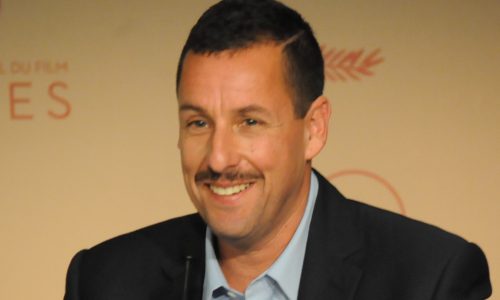
The film was followed by a press conference, attended by the writer-director and four of his key cast – Sandler, Stiller, Hoffman and Emma Thompson, as Hoffman’s alcoholic umpteenth wife – and mother of none of his children.
Thanks to questions from the audience, we learned that Sandler seems like a warm, genuine and unexpectedly humble man, but not naturally that funny, while Stiller delivered as many deadpan one-liners in his responses as a character in one of his more base films might be expected to utter. After the other stars had enthused about how much they loved the script when they first saw it – Sandler said it left him “misty-eyed and laughing” while Hoffman noted that “there’s a music to his writing” – Stiller moaned that “the first 30 to 40 pages were kind of slow”; his character first appears on page 41. Hoffman was similarly acerbic in some of his responses; as one co-star after another praised his body of work as daunting or inspiring, the 79 year old barked “I resent people saying they grew up with me.” Emma Thompson addressed the extent to which the film is both funny and sad, saying that often the funny bits are not the superficial bits, but the deeper bits. “That’s what life is like,” she added, “It’s wonderful to be serious. And then be funny,”
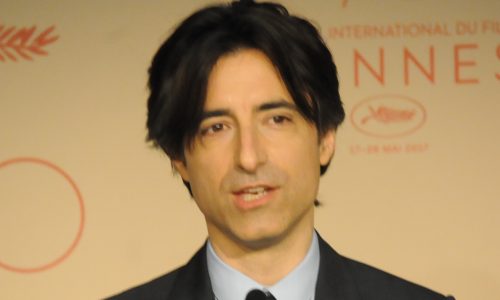
But while many of the questions were revealing or entertaining, what people wanted to know was Baumbach’s response to the jury president Pedro Almodovar’s criticism that it would be a paradox for a film to win any prizes at Cannes if it couldn’t be seen in cinemas – a dig at the distributor Netflix. After joking that he wasn’t aware ,of the comments, Baumbach assured the reporters in the room that the film had been made “independently, with independent money, with the expectation that it would be shown on the big screen. I believe in that. It’s a singular experience that’s not going away.” But Netflix acquired the completed film and he insisted that they’d been very supportive. A very diplomatic way to say “no comment.”
But perhaps the main thing that stuck in my mind, as I enthused about the film – and the subsequent press conference – to people I met during the rest of the day, was that having watched it and sat through a 45 minute question and answer session about it, I couldn’t actually remember how properly to pronounce the family name, Meyerowitz.
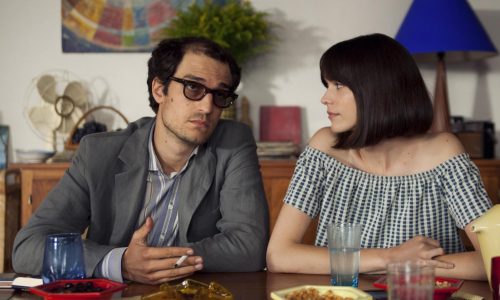
The press conference finished in time to grab a quick coffee and have a quick catch up with some fellow film journalists, before heading off to the roof-top Salle de Soixantieme – apparently ten years old this year – to see the latest film from The Artist‘s Michel Hazanavicius. Le Redoutable – or Redoubtable- chronicles the second marriage of the enfant terrible of French film Jean-Luc Godard, to the young actress Anne Wiazemsky, during the late 1960s and 70s, coinciding with his period of increasing radical rhetoric – both in his films and his campaigning. With so much pontificating about Maoist ideology, among other things, it’s not an easy watch – at times, with the Cannes subtitles being below the screen rather than on the image – you feel like you’ve been reading a book with no pictures. On top of outstanding performances from a lisping Louis Garrel and the captivating Stacy Martin, there were a handful of inspired moments from Hazanavicius. But his rip-off of – or perhaps homage to – Annie Hall’s “saying one thing but thinking another ” scene loses something in translation, because you have to read two translations at the same time – on different parts of the screen. It’s a strong film, but crucially, you don’t really get a sense as to why his political views changed and hardened over the period – or why Anne stayed with him as long as she did, as he took an emotional nose-dive that lasted more than a decade.
After a busy morning and afternoon, I returned to the action, smartened up slightly for the evening activities, which began with a relaxed reception at the Panama Film Commission. Had I saved up just a little bit more money over the past few years, the rum provided might have persuaded me to part with enough money to shoot a film in Panama. Their hospitality was as genuine as it was generous, as they agreed to let me leave with part of their office decoration: a giant inflatable Panamanian parrot, for now named Polly, as a gift for my three year old son back home. It seemed like a good idea at the time, but it wasn’t the kind of thing that could fit in your pocket and it would cause no end of issues for the rest of the evening, as it accompanied me to an unexpectedly growing number of events.
First was a two-part visit to the UK Film Centre, both to interview the BFI’s Head of International Isabel Davis and then to stay on for a London Film Festival Reception. As I waited for my interviewee, I was chatting to the BFI’s publicist, who broke off half way through a sentence, when she noticed the parrot. I had to explain that it was a Panamanian parrot, a gift for my son. She asked how old he was. Three, I told her. “Mine is too,” she replied excitedly. Or was it “Mine is two”? Either way, what began as a professional discussion about the inner workings of the British film industry descended into a typical conversation, fascinating only to parents, about nappies and nurseries, cut short only by the arrival of Davis.
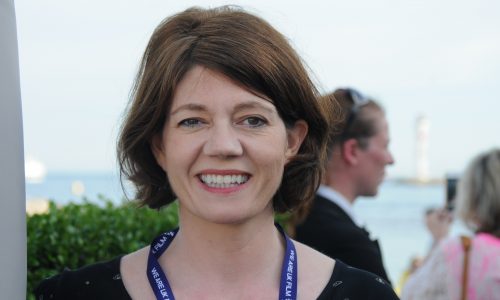
The interview was to try to ease the concerns of many of the people I spoke to at last year’s Cannes, a month before the referendum, when I was told by Ken Loach’s producer Rebecca O’Brien that “we’d be bonkers to Brexit” and a financier told me he wasn’t worried about the consequences to the British film industry of the UK leaving the EU…”because it won’t happen.” Consequently, many of the creative industries were surprised – and worried – by the result. But even though the future trade negotiations are still some way from even starting, the message from the BFI seems to be “fear not, British film-makers,” because most of the European money that comes into the UK’s film industry is not by virtue of its EU membership, but under the European Convention and other treaties that will continue to apply. Davis, who admitted to being one of those who’d expressed concern last year, offered as much assurance as she could at this stage. “People think there’s no certainty and actually one of the things we’re here doing this year is to give people certainty where we can, which is actually quite a lot of places. A lot of the European structures that British film depends upon, so for example the agreement that allows Europeans to co-produce with each other, are unaffected by Brexit because it’s an instrument of the Council of Europe not the EU, so that’s very good news and it’s obviously something that we’re telling people in droves. And they’re very happy to hear it because everyone wants to work with the UK and UK film-makers want to carry on working with Europe and further afield as well, so that’s one of the main points of clarity that we’re already able to give. ”
After she moved off to mingle, I did likewise, but I’m not generally very good at that part. But on this occasion, I kept getting tapped on the shoulder by strangers, asking about the parrot. It turned out to be one of my best networking events for years. About the only person I spoke to that didn’t begin with a question about the parrot was the London Film Festival’s Trisha Tuttle, who I caught, reaching out to steal the chocolate Palme d’Or from the top of my mini lemon meringue pie – or so I thought. She apologised and explained that she was trying to flick a fly off my meringue. I thanked her for her concern and flicked the fly off myself. Then she asked about the parrot.
Having stuffed myself with mini quiches and mini lemon meringue pies and chocolate slices, it was time to grab a more sensible dinner – the first hot food of my trip so far, so along with this year’s travelling colleague James Partridge, a film journalist, marketing executive and film festival director from New Zealand, I went for pizza. This took exactly the right length of time to eat for us to encounter another colleague, BBC Arabic’s Sam Asi, who had two spare tickets to the Netflix party – a shuttle-ride away, in the hills above the Cannes coastline. “Why not?” we both thought, knowing that sensible people would have returned to the apartment to write our articles and get some sleep before tomorrow’s 8.30am screening. But how could anyone resist a shuttle ride to a villa party hosted by the most controversial production house at this year’s festival?

The reception was at a villa so grand that the organisers laid on a shuttle-from-the-shuttle to get from the drop-off point to the party. This was more the kind of party that people who’ve never been to Cannes assume that everyone who goes to Cannes goes to. They don’t. But tonight, we did. As much proper champagne as anyone could need – none of that own-brand Cava. Mini-desserts on trays. A dance-floor and photo-booth. A swimming-pool that no-one, amazingly, got drunk enough to fall into. And, of course, a fair smattering of big-time Hollywood celebrities, most pertinent to this event being Tilda Swinton and Ben Stiller, the stars of Okja and The Meyerowitz Stories, the two respective Netflix films in competition, that Pedro Almodovar is so concerned about. Swinton was safely protected from preying members of the public in the VIP area, but Stiller was politely posing for selfies with guests bold enough to ask for one. Not us. But as I saw him heading for the exit, I did stop him. I congratulated him on the film – in no way sycophantic – pointing out that I’d been moved, both as someone who has a son and as someone who has a father. He smiled, thanked me and turned to leave. “Could I just ask one quick question, though?” I continued. He was too polite to roll his eyes. “Having seen the film and listened to the press conference – I still don’t know how to pronounce the film’s title? Your character’s surname.” A smile broke across his face. After a pause, he told me. “I can’t help you.” After another pause, he offered, “MYA-rowits? Mya-RO-wits?” He smiled, shrugged and was free to go. All that was left for me to do was to field off questions about the parrot and allow people to pose for photos with it, before we left.
